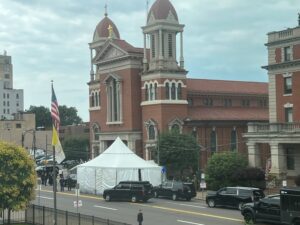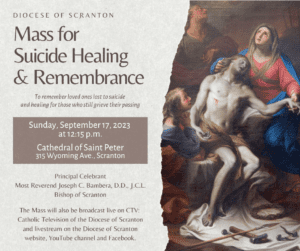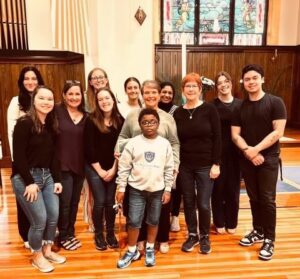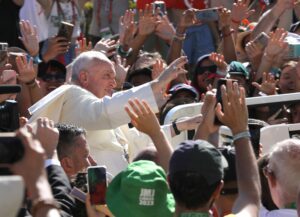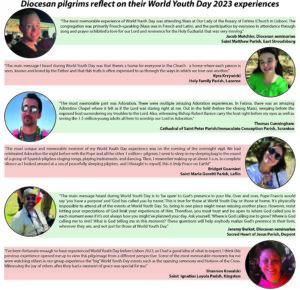18 August 2023
Mass of Christian Burial
Ellen Harding Casey
(1932-2023)
Cathedral of St. Peter
Funeral Homily of Msgr. Joseph G. Quinn
The closing words of the Gospel you just heard proclaimed are indeed a succinct statement of the lifetime philosophy of the ever amazing and truly remarkable Ellen Harding Casey.
First spoken by Jesus to His original disciples some two thousand years ago …. and to us, His current day disciples… listen to those words again as we all reflect upon the life of the good woman whose extraordinary ways bring us all together this day: “Rejoice And Be Glad, For Your Reward In Heaven Will Be Great.”
Ellen Casey knew the truth of those divine words … and she lived them out each and every day of her life over the course of her ninety-one year journey homeward.
And because she did that …. and did it so graciously, kindly and compassionately, we come together this day to mourn her death, pray for her eternal peace and perhaps most importantly, reflect upon the wisdom of her heart and the countless lessons to be learned from her blessed and graced life.
Before we proceed and do that, however, I just wanted to let you know that our dear shepherd, Bishop Bambera, deeply regrets not being able to be present for today’s funeral Mass. He is recovering from a medical procedure and asked that I share these, his words, with you:
“To Mrs. Casey’s beloved children, grandchildren and great-grandchildren … as well as her relatives and friends… please know of my sympathy and prayers. You lost the heart of your family and we lost a devoted public servant, a gracious presence in our community, a defender of human life and a woman of deep faith. May God give her rest and may you, her dear family, know God’s peace.”
And then there are the words of the President of the United States…. Scranton-native Joseph Biden … who so kindly made his way to this very Cathedral yesterday to express his heartfelt sympathy. In his own words, he noted:
“I’ve often said that everything important I learned in life I learned in Scranton and you don’t have to look any further than Ellen Casey to know why. To spend just a few minutes with Ellen was to get a lifetime’s education in Scranton values: Honesty. Decency. Integrity. Character. They were non-negotiable. It was who she was.
Kindness was not a sign of weakness. It was a sign of strength. And no one was more kind (… than Ellen.) … Family always came first. But life was about serving others. … She and Bob raised their eight children with these values passing along a (spirit of) devotion to family and (of always) serving others.”
And when one does truly live one’s life in that spirit – as both Ellen and her beloved Spike always did – one can indeed “Rejoice And Be Glad”….Confident That “Your Reward In Heaven Will Be Great.”
Some five centuries before Christ would walk the face of the earth, a young writer now simply known as “David” gave us the Old Testament “Book of Psalms” with its 150 psalms or prayers reflecting upon many of the same issues that all of humanity has always struggled with in the course of our journey of life. Wrestling with issues re the ultimate meaning of life. Pondering how it is we are to deal with each other. Prayers that focus on the issues and concerns we all have in one way or another in our often restless search for the inner calm we all need… that which is called “God’s Peace.”
Perhaps the 90th Psalm sums it up best of all when these words were written down: “Lord… maybe you give us 70 years. 80 if we are strong. And many of these are filled with emptiness and pain. So, Lord, teach us the shortness of our days that we might live them with wisdom of heart.”
And isn’t that what we all find ourselves pondering this morning as we reflect upon the life of this ever kind and modest, gracious ad elegant, pleasant and selfless woman of God? Isn’t our time together this morning intended by God for all of us to pause and remember how she made it through all the many chapters and challenges of her life’s journey? Shouldn’t we all be thinking right now about the genuine “Wisdom of Heart” that was seen consistently in the life and love that marked her long earthly pilgrimage homeward?
And if we did indeed do that, I think that with God’s graces at work in our lives, we would readily conclude that for Ellen Harding Casey:
- Coming to know God and learning to live one’s FAITH really does matter;
- Discerning one’s true purpose in life and committing oneself to intentionally fulfilling it does make a real difference;
- Remaining genuinely HOPEFUL in what one believes to be God’s purpose for your life DOES aid one in finding the inner calm and joy we all need to move forward one day at a time:
- And, finally, selflessly sharing one’s LOVE with and for others….. does help to rise to new life and truly understand the “shortness of our days” so as to live them humbly and honestly as did our beloved Ellen Casey.
Perhaps the great St. Augustine said it best of all when some 1,700 years ago when he noted that “Our hearts are restless, O Lord, until they rest in you.”
Said even more succinctly by Ellen’s famous husband, the original Robert P. Casey, in his noteworthy autobiography appropriately entitled “Fighting for Life” when speaking about his remarkable wife and the extraordinary mother of their eight children:
“It’s amazing to think back on our life and recall how little real planning went into it. (Ellen and I) never set out with any grand plans for the future. … After the birth of our first child we didn’t say, “Okay, seven more to go.”… From the start, the only real plan Ellen and followed was that whatever came our way – whatever joys and whatever troubles – we would live them together…”
And they did. Accepting the many twists and turns of life. Changing what they could and learning to live with the rest. Always remaining upbeat and hopeful…. Regardless of what happened along the way. Bearing the many crosses in their own lives… but never really complaining. Doing their best to treat everyone equally. They were blessed with good instincts… common sense and genuine humility. With God’s plentiful graces at work in their lives, they never lost hope nor did they ever allow their great smiles to fade.
Saint Paul could well have been speaking of Ellen Casey when he said: “Your kindness should be known by all….. Have no anxiety at all. But in everything, by prayer and petition, with a grateful heart, make your requests known to God… and then the peace of God that surpasses all understanding will guard your hearts and minds in Christ Jesus.”
Bravely, courageously and amazingly they both faced overwhelming health challenges in the course of their lives, but never gave up without extraordinary efforts. They loved life and both did all they could to respect it, protect it and help others persevere. And with their unshakable faith, neither of them ever feared death. Throughout it all, they did indeed “rejoice” and did remain both “grateful and glad” ….. which will always happen when, as they both did, one realizes that we are not here for ourselves…. but here to live our lives in generous fashion “with and for others.”
On that note, allow me to close with the inspired and challenging words of St. Ignatius of Loyola…. the founder the of the Society of Jesus…. better known as “The Jesuits” who once wrote:
Lord, teach me to be generous.
Teach me to serve You as You deserve;
to give and not count the cost,
to fight and not heed the wounds.
to toil and not seek for rest,
to labor and not to ask for any reward,
except that of knowing that I do Your will.
Throughout all of her life, Ellen Harding Casey did precisely that. She lived her life with an endlessly generous heart.
May she now be reunited with her beloved husband and her ancestors and friends as together they all celebrate the eternal peace and joy of heaven.
Rejoice And Be Glad, Ellen, For Your Reward in Heaven Will Be Great.

